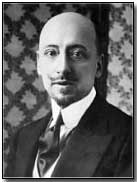Who's Who - Gabriele D'Annunzio
 Gabriele D'Annunzio (1863-1938), the
Italian poet and political agitator, fought with the Italian army and air
force during World War One and was responsible for the capture of Fiume
immediately after the war.
Gabriele D'Annunzio (1863-1938), the
Italian poet and political agitator, fought with the Italian army and air
force during World War One and was responsible for the capture of Fiume
immediately after the war.
Having had his first volume of poetry published while aged only 16 D'Annunzio established for himself a reputation not only in the arts world but also as a political agitator. He was returned to the Italian Parliament in 1897 where he was consistent in his championing of Italian nationalism; he was particularly vocal in his insistence that Italy's 'lost' territory on the Adriatic be reclaimed.
Emigrating to France so as to escape from debt in 1910 he was still there when war broke out in Europe in August 1914. D'Annunzio - who had a marked talent for self-publicity - campaigned for Italy's entry into the war on the side of the Entente Powers.
Following almost a year of an official policy of neutrality Italy finally entered the war on 23 May 1915. D'Annunzio, who by 1915 returned home, promptly enlisted with the cavalry before commanding a torpedo boat. Finally turning his hand to the air force D'Annunzio established a reputation as a war hero when he lost an eye in action.
A man of remarkable energy and continuous enthusiasm (generally self-directed), D'Annunzio gained fame for leading a flight mission of eight aircraft over the Austrian capital in August 1918 dropping leaflets aimed at demoralising the Viennese population. The leaflets were penned by himself.
Following the armistice D'Annunzio resumed his aggressive pre-war nationalist stance. He charged that the Italian government (led by Vittorio Orlando) had not done enough to achieve Italy's just desserts at the Paris Peace Conference. In January 1919 he suggested that the much-disputed port of Fiume should be simply confiscated by the Italians, along with Dalmatia.
Ever a man of action D'Annunzio himself led a march upon Fiume and secured its capture in September 1919 (aided and abetted by a band of Italian mutineers). While wildly popular with the general populace at home it nevertheless proved a heavy embarrassment to the Italian government. In the face of official opposition D'Annunzio nevertheless managed to hold on to Fiume until he was forcibly ejected in January 1921 by the Italian navy.
Mussolini's appearance on the Italian political scene somewhat dwarfed D'Annunzio's popularity. Although a committed fascist himself (derived from the writings of Nietzsche) he recognised that further designs upon high political office were likely to come to nought, and he entered into decadent, drug-ridden retirement in 1922. He was created Prince of Montenevoso in 1924.
He died in 1938.
A sandbag was a sack filled with earth from which defences were built.
- Did you know?
